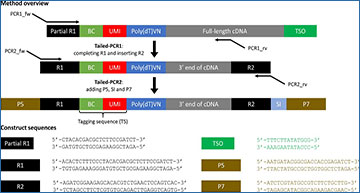As no existing methods within the single-cell RNA sequencing repertoire combine genotyping of specific genomic loci with high throughput, KU Leuven researchers evaluated a straightforward, targeted sequencing approach as an extension to high-throughput droplet-based single-cell RNA sequencing. Overlaying standard gene expression data with transcript level genotype information provides a strategy to study the impact of genetic variants.
The researchers describe this targeted sequencing extension, explain how to process the data and evaluate how technical parameters such as amount of input cDNA, number of amplification rounds, and sequencing depth influence the number of transcripts detected. Finally, the researchers demonstrate how targeted sequencing can be used in two contexts: (1) simultaneous investigation of the presence of a somatic variant and its potential impact on the transcriptome of affected cells and (2) evaluation of allele-specific expression of a germline variant in ad hoc cell subsets. Through these and other comparable applications, our targeted sequencing extension has the potential to improve our understanding of functional effects caused by genetic variation.
Targeted library preparation consists of two rounds of tailed-PCR starting from amplified cDNA
The constructs and sequences displayed are for extension to the Chromium Single Cell Gene Expression Solution (v3 and v3.1, single index), which captures the 3′ end of transcripts. Image is conceptual and elements are not necessarily proportional. BC, 10x cellular barcode; cDNA, complementary DNA; P5/P7, priming sites used in Illumina sequencers; R1, TruSeq Read 1; R2, TruSeq Read 2; SI, sample index; TSO, template switching oligo; UMI, unique molecular identifier.
Van Horebeek L, David M, Dedoncker N, Mallants K, Bijnens B, Goris A, Dubois B. (2023) A targeted sequencing extension for transcript genotyping in single-cell transcriptomics. Life Sci Alliance 6(11):e202301971. [article]





